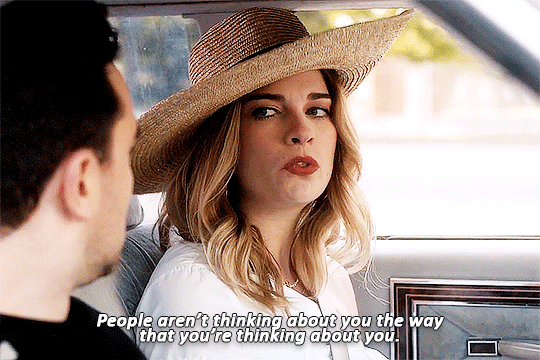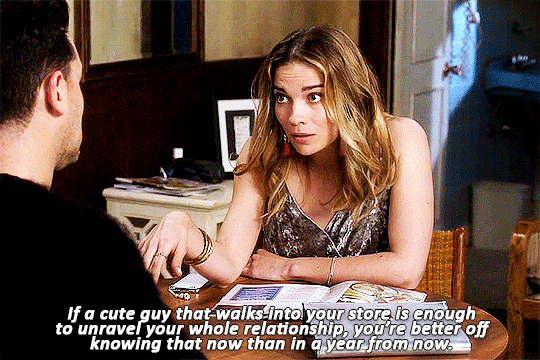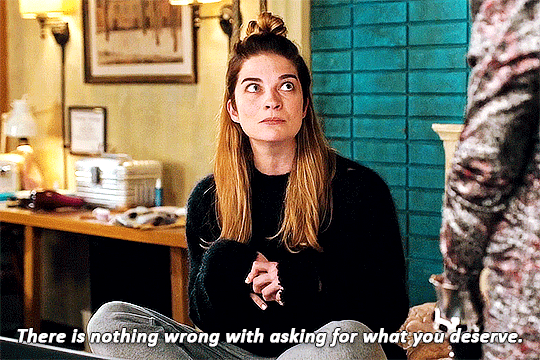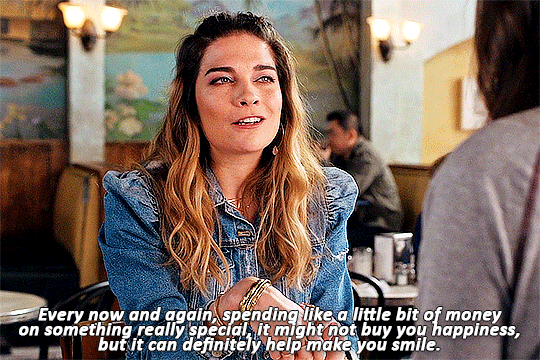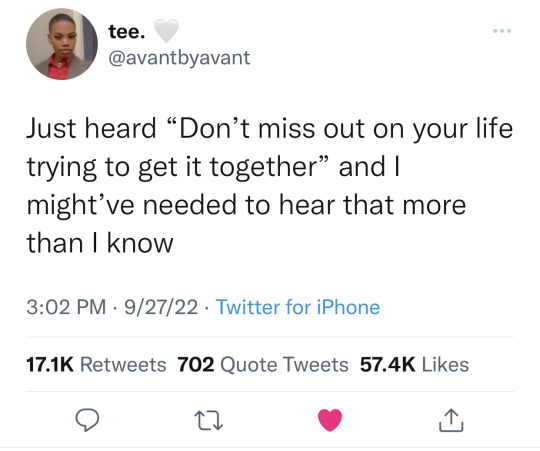Text
listen I know sometimes everything sucks and the world feels awful and like everything is out to get you but I promise even on your worst days the small mundane joys still prevail. your favourite plants and animals are still hanging out in nature. your favourite music still exists and you can listen to it whenever you want. your favourite media or that hobbie you used to love is still around waiting for you if you'd like to revisit it. you can still eat your favourite food or have your favourite drink. you can still spend time or talk to the people that love you. the stars are still in the sky and the sun will rise and set again and bring with it all of the colours of the sky. there are still things worth holding on for, sometimes you just have to look a little harder but I promise they're there.
4K notes
·
View notes
Video
the meaning of life
369 notes
·
View notes
Text
But aspd-culture, what "causes" ASPD?
Well, that's hard to say as it is commonly a mix of nature and nurture, and we can't say for sure "this set of things will cause ASPD". I can, however, explain some serious risk factors that, if you relate to them and have this disorder, may have been a part of why you developed it.
TW for heavy topics, as you might have guessed.
Just a heads up that, if you have the disorder, this one is gonna be a rough read. A lot of things that you were told throughout your childhood should be "normal" and maybe that you even thought were helping you are gonna pop up here as things that heavily increase the chances of ASPD, and we're not just talking about abuse and neglect, though of course that is the first one I'm gonna get into because it's the most obvious and well-known risk factor. Do expect some other information you might not have been ready to hear, though.
So the first one, as I said, is maltreatment as a child. This can include many kinds of abuse, including verbal, emotional, physical, sexual, etc. There are some reasons to believe that sexual abuse in particular, especially long-term sexual abuse, significantly increases the chance of developing ASPD.
The next is neglect, which also comes with a significant risk of developing ASPD, especially if the neglect is related to both the emotional and physical needs of a child. If the child experiences neglect in regards to needs such as food, hygiene, shelter, medical care, etc, but does not experience emotional neglect, the risk of developing ASPD appears to be somewhat less than if the child experiences both.
Maltreatment and neglect before the age of 18 months is especially significant when it comes to risk of developing ASPD. Not greeting an infant, not properly showing emotion and "appropriate affect" to an infant, and in particular a lack of attachment from their mother (either due to her literally being absent or just emotionally absent and disconnected) during the first 18 months of life are less commonly thought of forms of neglect that seriously affect secure attachment and increase the risk of ASPD.
The third and last of the "expected" answers to this question is witnessing intimate partner violence during childhood, especially regularly or across multiple partners. This shows the child two things: one is a fear of the aggressor as well a need to tiptoe around someone who should be a secure caregiver to avoid danger, and the second is a disbelief that the victim of the violence is able to protect them from danger, either because they appear weak (children are supposed to believe until a surprising age that their parents are superhero levels of strong and unable to be intimidated or weakened) in the eyes of the child, or because the child does not want to bother them with their issues when they already have their own abuse to deal with. This is especially true in cases where the child successfully controls the violence where the adult cannot (think those kids who use themselves as human shields because the abuser doesn't dare touch the child for various reasons), as it makes them feel they are responsible for protecting both themself and their caregiver, which disrupts normal attachment.
Here's where we get to the less obvious, more specific stuff that can lead to ASPD. There are multiple studies showing that an excess of television (I know, but hear me out bc this isn't about violence on tv), specifically when it is being used as a stand-in parent, significantly increases risk of developing ASPD even when other factors are controlled. As someone with ASPD, I can 100% see how this is valid. I used television to try and understand what normal people were like, and in turn, I experience a weird type of affective "empathy" when shown emotions in the over-acted way that they do on sitcoms, even though I do not experience that empathy when shown normally expressed emotions either on tv or in real life.
It also makes sense to me because generally when TV becomes a stand-in parent, the child is watching other children be cared for in ways that they are not in real life. The child may then be led to believe (as I was) that caring about other people is something made up for TV, since that's the only time they see it. Once the brain develops the understanding of fantasy vs reality, if TV is the only time that a child sees secure attachment styles, loving and attentive caregivers, etc, the brain may falsely place that in the fantasy category. That can lead to the thought processes and attachment issues that are typical of pwASPD, including feeling as though only they can be trusted to look out for themselves, that irl relationships are supposed to be transactional vs emotional, etc. So if you, like I did, attempted to watch sitcoms and such like Full House, Boy Meets World, etc. as a way of understanding what a normal family is supposed to be like or to understand how people are supposed to interact with each other, it is very possible that that was a contributing factor to the development of your ASPD.
Another somewhat surprising one: show of hands on how many pwASPD grew up hearing "it's just a joke", "you have no sense of humor", and "lighten up, we're just teasing you" - either from other kids, caregivers, or both?
Teasing is believed to be another major factor in developing ASPD. Teasing can cause a child to feel insecure, unsafe, and attacked when coming from people the child does not have a secure attachment to, and can decrease chances of the child developing that secure attachment later. This is especially true if the teasing came from caregivers, and of course has a higher chance of affecting the child if they attempt to set boundaries around it and aren't respected in that. This leads to the child feeling attacked by the people they are supposed to go to for comfort, and the more people who tease the child, the more likely the child is to feel unsafe around people as a whole - leading to the mindset that all people are dangerous and that the only person the child can trust is themselves. This teasing also causes self-imposed isolation as a way of feeling secure, which reinforces again that people are inherently unsafe and the only person the child can trust is themself. So if you tried to communicate your distress, discomfort, etc. about being teased and were dismissed, especially by your caregivers, then that significantly increased the chance that you would go on to develop ASPD.
One that is currently debated as to if it is a factor or not is the presence of an overprotective mother, specifically if that over-protectiveness became a point of contention between you two as you became more independent. It's surprising because a major characteristic of children who develop ASPD is independence, and most hold the belief that only they will protect them, but the reasoning is sound imo. The reason for this one, from those who believe it is associated with ASPD, is that when a child goes through the normal process of asserting independence, if they are met with either fear tactics as a form of control or heavy anxiety from their maternal figure, the child learns to be insecure, anxious, and obsessive about protecting themselves because they are being taught that the world is not safe/that they are not capable enough to explore that world. This can lead to an overblown expectation of the danger in the real world and leads to anxiety and distress around outside people. This anxiety and nervousness about the world can lead to the child seeing everyone and everything else as a threat, a mindset that is commonly associated with ASPD. If that anxiety is later disproven (as it inevitably will be unless the child experiences significant trauma - itself a risk factor for ASPD), this causes a rift in the attachment to the caregivers in question, and can make the child distrust their judgement and ability to assess risk, which again affects how safe the child feels with them. This is especially true if the connection to their caregivers is weakened by inconsistency, abuse, neglect, or other factors.
Any inconsistent behavior from caregivers, in fact, is another risk factor for developing ASPD. Children need to be able rely on consistency and routine to feel secure and develop normally. If they are constantly uncertain of how safe they may be with one or both caregivers, they are more likely to learn the idea that the only person they can rely on is themself.
Note that all of this is based on the current scientific understanding of ASPD's development, which deals significantly in both stigmatized and entirely false beliefs about the disorder. However, I focused here on points that made sense to me as someone with it, and did my best to explain how these contribute to ASPD through that lens in addition to the potentially biased medical lens. Our understanding of psychology in general is always changing, but these are some risk factors that are commonly believed at the time of writing to increase the chances of developing ASPD.
Also worth noting is that all of these factors do not need to be present to have ASPD develop. These factors significantly increase the risk of developing ASPD, especially when combined with a genetic component, but I am in no way claiming that you have to have all or even any of these to have ASPD.
I hope this helped you understand this disorder and the people with it a bit better. If you know someone with ASPD, maybe this can help you process why they hold the beliefs they do, and if you have ASPD and feel comfortable, feel free to show or explain some of this to your friends if you think it may help them understand where you're coming from a bit more.
A lot of the stigma, I think, comes from the fact that people don't get what we went through that led our brain to believe our antisocial traits were the best way to protect ourselves. For some, a little more light shed on that subject may be all they need to be more compassionate about it. And if you went into this with a negative outlook on pwASPD, I understand. It's easy in the world we're in to end up with that thought process. I appreciate you reading this far and ask you to read just a bit further to the end.
Try if you can to imagine what it's like to be a kid who has been through more than most adults have in their entire life and gotten so little help that that little child believes no one in the world protects anybody else. Imagine what kind of a world we were picturing growing up in because at the time, that was all we had ever seen. It would be horrifying, right? Even worse than the already pretty sucky world we currently live in. Imagine being a child and thinking that every other kid is going through the same stuff you are at home and handling it so much better. And for some, imagine knowing that some don't or that they get help, but not knowing why your life is different. Would you want to live in that world? Would you be able to keep the innocent, childlike wonder? Would you not be angry and hurt and confused as to why you didn't deserve the help and the life other kids get? Many of us lived thinking that from painfully early ages.
Is it so far-fetched for us to think we needed to protect ourselves if everyone was like the sample size of people we had met? Is it so shocking, then, that our subconscious thought that the traits we have now would be the only way to keep us safe? Is it really that surprising that a child so rarely, if ever shown kindness and empathy, might grow up not knowing how to replicate that for other people?
Most of us looked down the barrel of a proverbial (for some of us, literal) g*n as a toddler to young child, so we put on a vest. How were we supposed to know that other children had never felt that unsafe? How were we supposed to know that someone was supposed to help us when they never did?
Just food for thought. Thanks for reading.
111 notes
·
View notes
Quote
Note to self: You’ve gotta do this for you. This is for you. This isn’t about anybody. Live for you. Honor you. Never lose sight of that.
Unknown (via quotemadness)
2K notes
·
View notes
Text
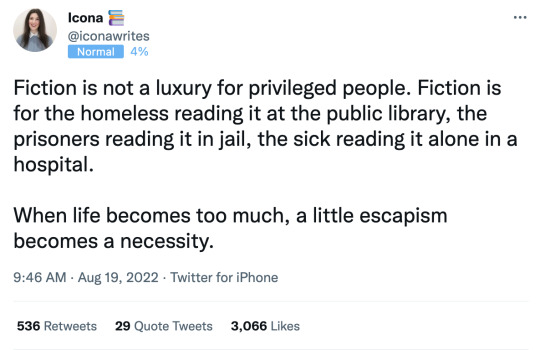
Fiction is not a luxury for privileged people. Fiction is for the homeless reading it at the public library, the prisoners reading it in jail, the sick reading it alone in a hospital.
When life becomes too much, a little escapism becomes a necessity.
– Icona (@/iconawrites)
2K notes
·
View notes
Text
Starting to see that it's actually very normal for the abused kids to get themselves in sort of, bad situations in real life, and then just slowly progress to less-bad, and less-bad, until it gets to a place where we feel comfortable, or at least we're able to hold on without having a crisis.
This doesn't happen because as an abused kid, you're now doomed or attract toxic people, those are just myths. It is true that we will easily tie several bad things that have happened to us together, and decide that it's a proof that things will always be bad for us, and that isn't true either, bad things actually do happen to everyone. With us, it just hits worse, feels worse, triggers us and forces us to re-live everything else bad that has happened, and creates more ominous symbolism. We're also unlikely to receive comfort, so we're always in our bad situations alone and feel abandoned. That is enough to make anyone despair.
But there is a timeline with a fairly slow progression from 'abuse' to 'less abuse' to 'healthier environment'. I don't think I know any cases where a person went from abuse to 'safe and loved for eternity', and it has to do with how we view the world, and how everything we learn is relative to each other.
For instance, after running away from abusive parents, I spent a long time being just extremely grateful that I'm not in physical danger anymore, and that nobody is yelling at me. There were several injustices happening to me, I was financially exploited despite being in severe poverty, I accidentally associated myself with people who exploited my labour and did some extremely sick things to me, but how would I notice? I was busy feeling grateful for not being assaulted. You can't tell someone who just got out of hell 'hey, this is bad too, actually', because what they're seeing is 'this is so much better than hell, this is the best situation I've ever been in, I'm so grateful this isn't worse, this level of injustice is nothing.'
But, to a person who hasn't experienced severe abuse or injustice, it wouldn't be 'nothing', it would be stuff worth calling the police over.
We just can't see it because, relatively to our life, this is the best we ever experienced, and whatever bad things are happening, are usually detected as 'minor' and ignorable'. This is likely to get us into several bad situations, but it's also inevitable, we can't quickly jump from abuse to healthy. It takes some layers of bad for us to notice that we could actually, do better. Sometimes the bad situations turn into worse, and then we realize it's actually bad and triggering, and we get out. Sometimes, bad people go away all on their own, and we realize then, that we're happier.
The good news is, that after getting away from the worst of the abuse, we often will feel like 'this is the most freedom I ever had, this is the best I was ever treated, this is the most love I've ever gotten, I'm so grateful this is better than before', and that is a good thing to experience. Bad thing about it is that often sometimes later, we will go 'oh. that actually was bad and I couldn't tell.' but the point is, you're smarter now, and you'll realize it next time, and slowly you'll always keep going toward better and better life situations.
I'm writing this to let you know it happens to everyone else too. We all go thru some level of additional messes and we don't see them as messes, we only realize it in retrospect. So don't blame yourself if you don't know how exactly to put yourself in a good situation after you've experienced so few of them! It might be a rocky road, but it won't feel like one, not until you look back. You're always moving forward, and every single thing you didn't realize at the time, that it was bad, is generally how we all move forward and learn about these things. You can't know it all at once.
208 notes
·
View notes
Text
just because i didn’t get the psych treatment i deserved and tossed around and even manipulated
doesn't mean someone else got the help they needed
some people need medication but it shouldn’t feel forced more of self care and reasons why they want to help and you need it
some people need hospitals but we can’t get rid of the fact it can be traumatizing and make things worse
some people are listened too and I'm happy for you
im happy some people can feel safe in therapy
we have too see both sides
i can’t stigmatize the whole system but i can’t deny iv meet people including me who
are manipulated by doctors and nursing
not listened too
over medicated
told they aren't actually experiencing symptoms of something
gaslight
told over exaggerating symptoms
told experiencing relapse after the repression of the symptoms come back because of being just not listened too and they knew better
“ i got better “
no i repressed it unconsciously because of words and actions you said and eventually it came back because i wasn’t faking
i was suffering
my mind learned to repress and not remember because of professionals who didn’t wanna listen to their patient rather what they have seen in school or from another patient
i don’t know if u have had a therapist ask another patent under the radar of if they experienced something i did because they are diagnosed with that disorder. and well since they didn’t experience it it wasn’t what i was experiencing. or even possible.
i just wanted to be listened too
i hope i get to meet more open therapists and doctors and nurses
not ones who don’t wanna meet me at my needs rather than theirs
( there’s more but it was a lot for that to come out )
#tw psychiatric abuse#tw psychiatry#tw anti psychiatry#tw trauma mention#tw medical trauma#tw meds mention#tw ptsd#complex ptsd#childhood ptsd#Childhood Trauma#tw child harm
2 notes
·
View notes
Text
I hate when people use the fact that sometimes people are misdiagnosed as having personality disorders to try to say that personality disorders are Not A Thing™.
Your autism was misdiagnosed as SzPD/BPD/STPD/AVPD/ASPD/OCPD? Cool, doesn't mean that they're aren't people who genuinely have SzPD/BPD/STPD/AVPD/ASPD/OCPD.
You were diagnosed with HPD by a professional who hated you as a way to dismiss you as "just an attention seeker"? Sorry that happened, but that doesn't mean they're aren't people who do have HPD.
You confided in a professional about a stalker/abuser and they diagnosed you with PPD due to medical misogyny? That shouldn't have happened, but that doesn't mean they're aren't geniune cases of PPD.
I'm so sick and tired of people using the fact that sometimes people are misdiagnosed with personality disorders to tell people with PDs that their disorders aren't real, or to claim certain PDs are "rooted in anti-autistic ableism/misogyny/ect", or worse, try to campaign for these disorders to be removed from the DSM/ICD.
I'm sorry you were misdiagnosed, but that doesn't mean these disorders don't exist. Trying to remove personality disorders' awareness, treatment options and place in diagnostic manuals is not going to prevent misdiagnosis, it's just going to make it harder for people with severe mental illness to get help.
837 notes
·
View notes
Text
Be the person your teenage self wanted and needed in their life.
You may not be able to change the past but there will be a kid out there screaming to know people like you exist.
3K notes
·
View notes
Text
Not from UK but rebloging for others
this is so so important to me and mine, and I'm asking you to Do Something so I'll respect your time and keep it brief

in the UK, if 100k sign a a government petition it will be brought to Parliament and debated. y'all know this country is suffering from some 80s-style bigotry right now, and this is one symptom: almost 200k fuckholes have come together to force the government to discuss whether it is 'appropriate' to tell children that queer people exist. this is a big symbolic victory for them. and i am burning with fury.
please, if you're from the UK, sign this counter-petition so they can at least see how much of a minority they are. simply put, the attempt to put these bastards in their place isn't gathering enough steam. there are barely 2000 more signatures now than there were this morning (27th January 2023), and that isn't enough. i refuse to let these people feel even a moment of victory or satisfaction. please help.
64K notes
·
View notes
Text
*through gritted teeth* you are not a child taking a test with the purpose of getting the highest score, you are an adult trying new things and finding ways to enjoy your life, make mistakes, be a beginner, be mediocre, be where you need to be, be unlikeable, just. be.
187K notes
·
View notes
Text
If you ever reached out for help and it went badly, I want you to know that was ENTIRELY a reflection on the people you reached out to and not on you. You deserved help. You deserved support. You deserved to heal. It may still hurt if you were not treated with that level of love and compassion and you are entirely allowed to feel that way, but do not let it reflect on how you feel about yourself and the support you deserve.
12K notes
·
View notes
Text
Hey, PSA:
On your phone, go to Settings> Security and Privacy> Privacy> Other Privacy Settings> Ads> Delete Advertising ID
Then go back to Other Privacy Settings> Google location history> Turn off Location History &/or Turn-on Auto-Delete (you can set a time period of how long to keep it)
Then, staying on Other Privacy Settings, go to ’+ See all activity controls’> Web & App activity> Turn off (you can also turn-on Auto-Delete for here too)
Then Scroll down to Personalized ads> My Ad Center> Turn Off Personalized Ads.
Google has no business knowing/storing everything you do online, and knowing/storing where you go everyday. Turn it off.
These instructions are for an Android phone, IOS might be different. If you have IOS or another operating system feel free to add on with your own map to where they’ve buried these settings in your phone to help others.
41K notes
·
View notes

